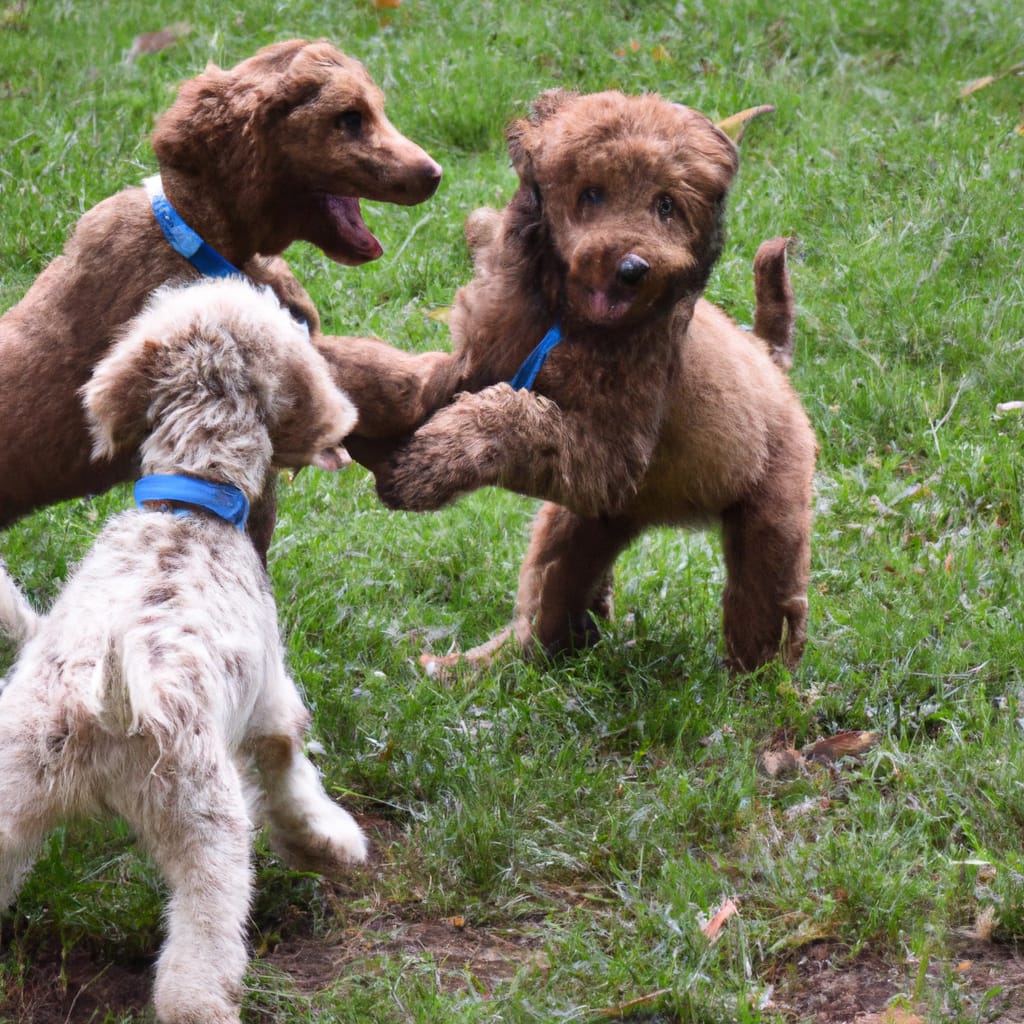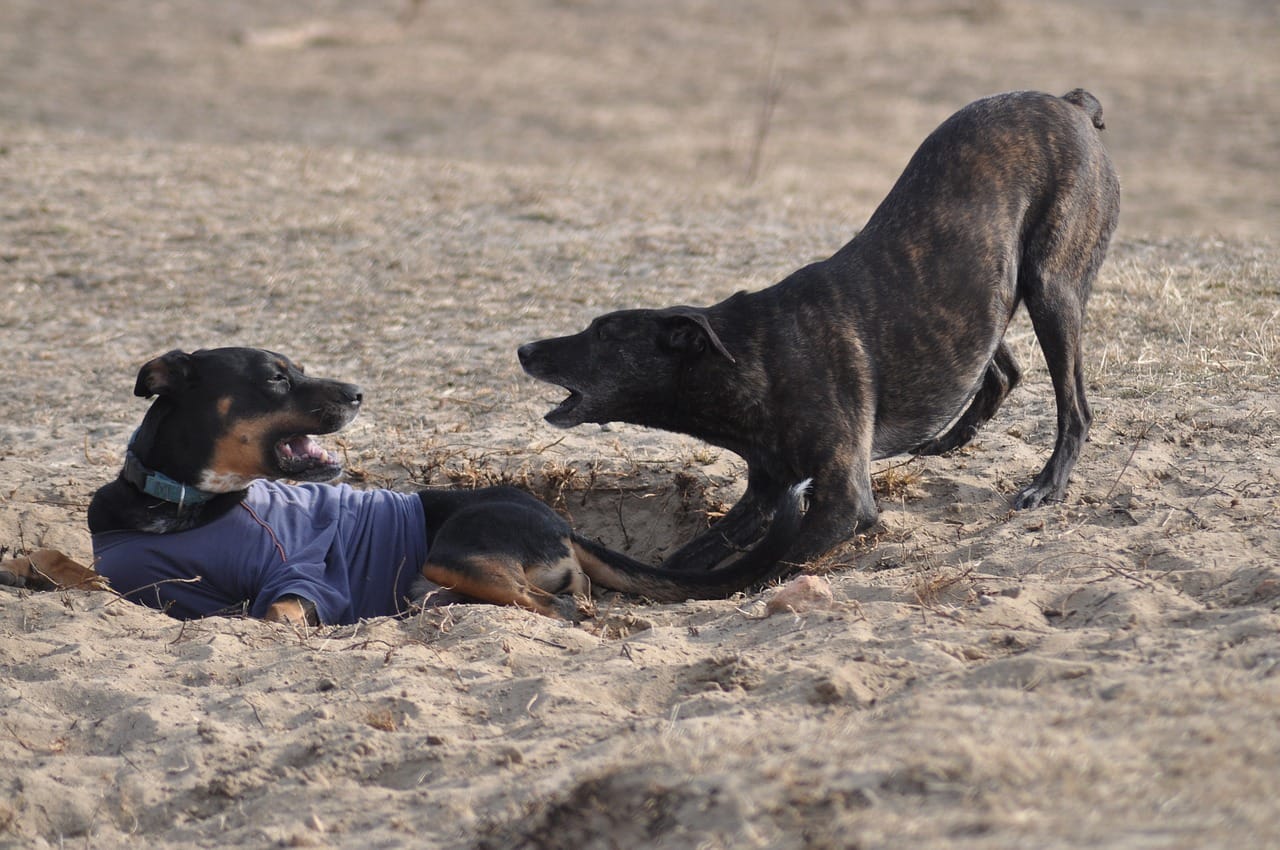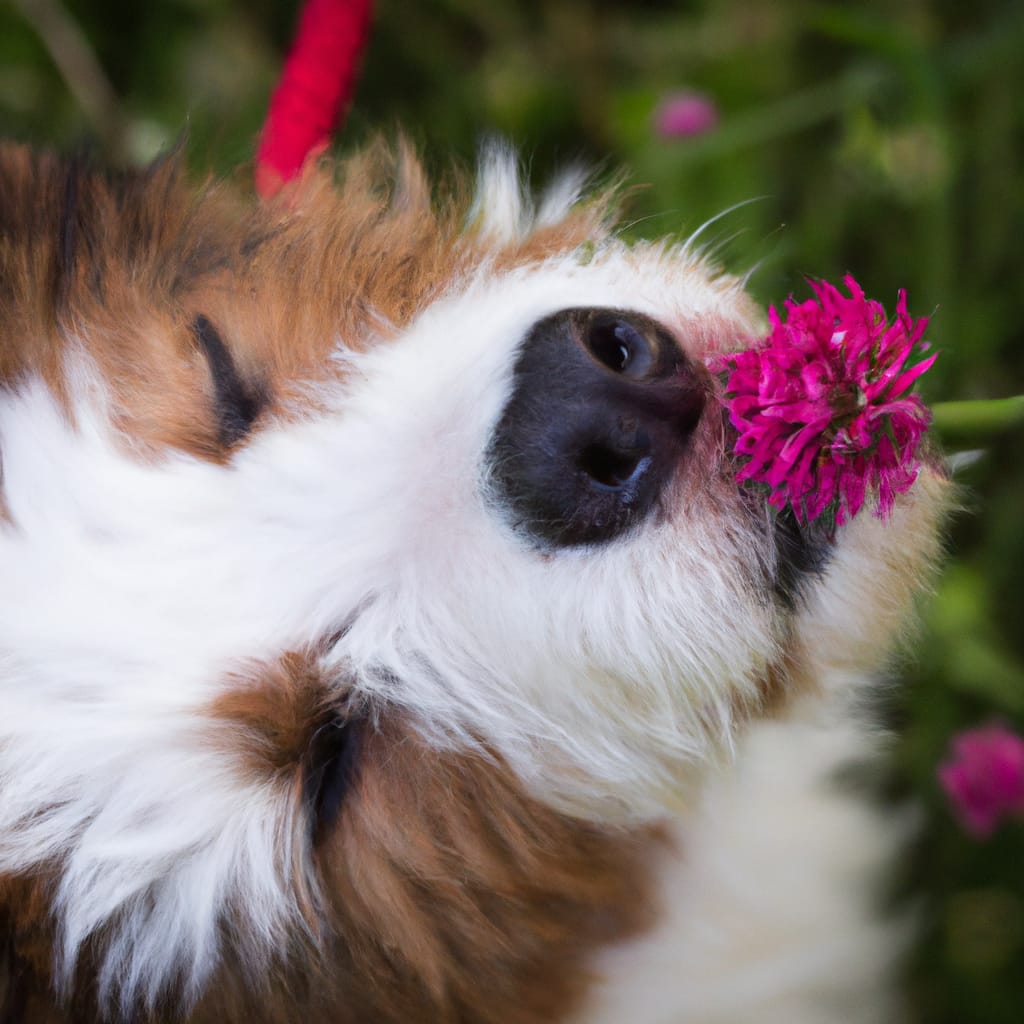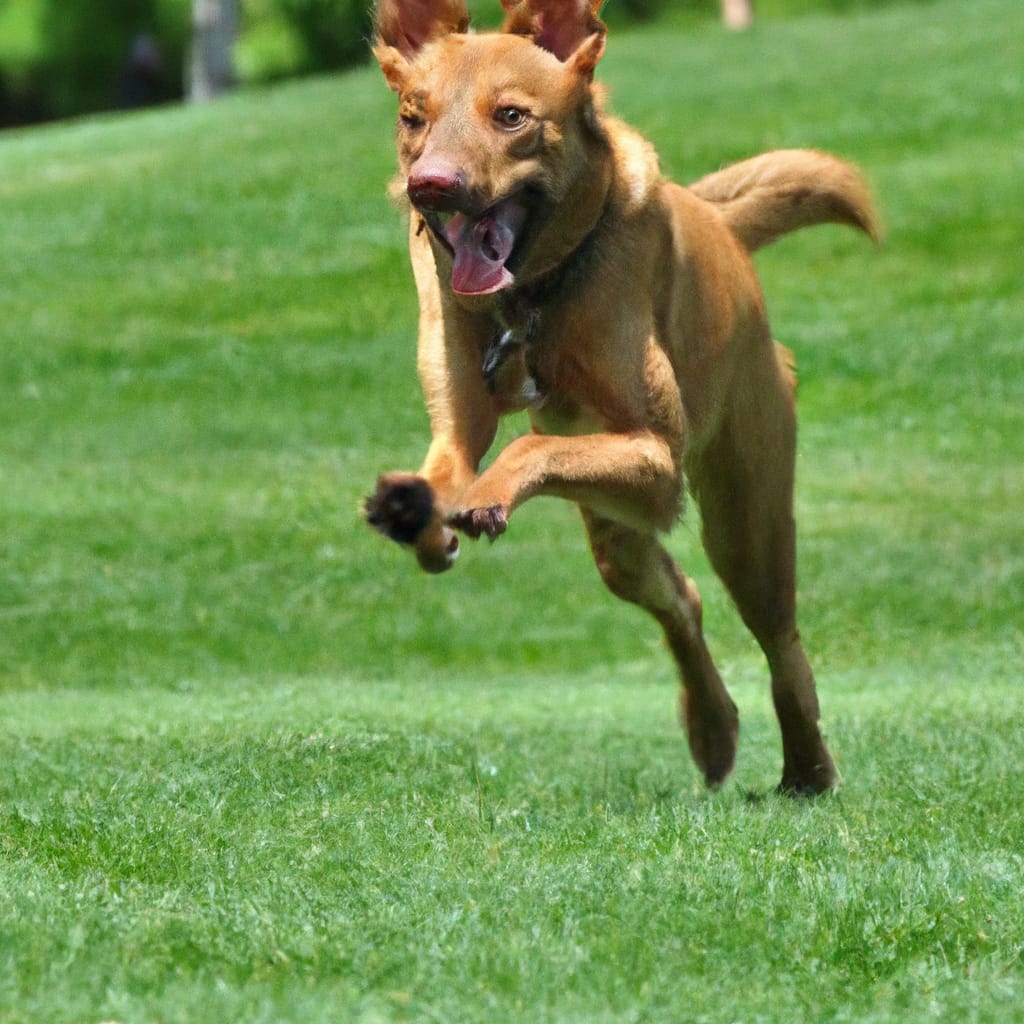Exercise And Socialization: Essential For Doodle Puppy Development
Are you a proud owner of a Doodle puppy? Well, then you’re in for a treat! In this article, we will discuss the importance of exercise and socialization in the development of your adorable furry friend. As any responsible pet parent knows, providing these two key elements is crucial for your Doodle puppy’s overall growth and well-being. So, let’s dive into the world of exercise and socialization and discover how they can positively impact your puppy’s development.
The Importance of Exercise
Exercise is not only important for humans, but it is also crucial for the overall well-being and development of doodle puppies. Regular exercise provides a plethora of benefits that contribute to their physical and mental health. By engaging in physical activities and socializing with others, doodle puppies can lead a happy and fulfilling life.
Physical Benefits
Regular exercise helps doodle puppies maintain a healthy weight and prevents obesity, which can lead to various health issues. Engaging in physical activities such as walking, running, and playing fetch is essential for their cardiovascular health. It strengthens their muscles and bones, improves their coordination and flexibility, and enhances their overall physical fitness. Additionally, exercise helps stimulate their digestive system and promotes healthy bowel movements.
Mental Stimulation
Exercise also plays a crucial role in providing mental stimulation for doodle puppies. Just like humans, they need activities that challenge their minds and keep them engaged. Physical activities such as puzzle toys, interactive games, and obedience training not only tire them out physically but also provide mental stimulation. This helps prevent boredom and destructive behavior, as well as fosters their cognitive development.
Energy Release
Doodle puppies are known for their playful and energetic nature. Regular exercise provides them with an outlet to release their excess energy. By engaging in activities that allow them to run, play, and explore, doodle puppies can expend their energy in a positive way. This helps prevent behavioral problems that may arise due to pent-up energy, such as chewing on furniture or excessive barking. Regular exercise allows them to tire out both mentally and physically, leading to a calmer and more well-behaved pet.
Exercise Guidelines for Doodle Puppies
When it comes to exercise, it is important to consider the age and energy levels of doodle puppies. By tailoring the exercise routine to their specific needs, you can ensure they receive the appropriate amount of exercise without overexertion.
Age and Energy Levels
Doodle puppies have different exercise requirements depending on their age and energy levels. Younger puppies require shorter exercise sessions due to their developing muscles and joints. As they grow older, their exercise sessions can gradually increase in duration. It is important to match their energy levels with appropriate activities to prevent exhaustion or injuries.
Frequency and Duration
Doodle puppies should engage in exercise sessions multiple times a day. Short bursts of exercise throughout the day are more beneficial than one long session. As a general guideline, a puppy may require 5-10 minutes of exercise per month of age, up to twice a day. For example, a three-month-old puppy may need 15-30 minutes of exercise divided into two sessions.
Suitable Activities
Doodle puppies benefit from a variety of activities that cater to their exercise needs. These can include short walks, playtime with other puppies or dogs, interactive games such as fetch or hide-and-seek, and mental stimulation through puzzle toys or obedience training. It is important to choose activities that are suitable for their age and physical capabilities to avoid any injuries. Consulting with a veterinarian can also provide guidance on the most appropriate exercises for your doodle puppy.
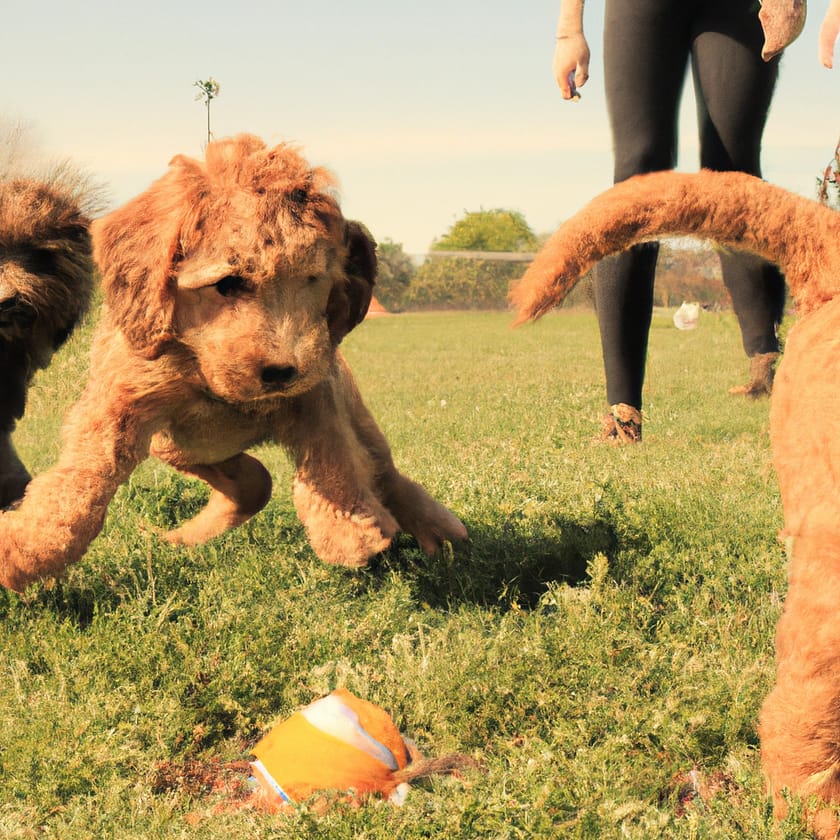
Socialization: The Key to Well-Adjusted Doodles
Socialization is an essential aspect of doodle puppy development. It involves introducing them to different experiences, people, and animals to ensure they grow up to be well-adjusted and confident dogs. Proper socialization during the puppy stage sets the foundation for a positive and friendly demeanor as they mature.
Introduction to Different Environments
Doodle puppies should be exposed to various environments from an early age. This includes different outdoor settings, such as parks, streets, and beaches, as well as indoor environments, such as homes, pet-friendly stores, and veterinary clinics. By familiarizing them with different surroundings, they learn to adapt to new situations with ease and develop a sense of comfort no matter where they are.
Positive Experiences with People
Doodle puppies should have positive interactions with a wide range of people, including children, adults, and the elderly. This helps them develop trust, confidence, and a friendly disposition towards humans. Introducing them to people of different appearances, sizes, and behaviors helps them become comfortable and tolerant in various social settings.
Exposure to Other Animals
To become well-rounded and socialized dogs, doodle puppies should have positive experiences with other animals. This includes interactions with dogs of various breeds, sizes, and temperaments, as well as exposure to different types of animals, such as cats, rabbits, or birds. These interactions enable them to understand and communicate with other animals, fostering their social skills and ensuring harmonious interactions in the future.
Development of Social Skills
Socialization helps doodle puppies develop important social skills, such as appropriate behavior with other dogs and humans. They learn how to communicate effectively, display acceptable play behaviors, and understand social cues. By engaging in positive interactions and experiences, they build confidence, emotional resilience, and a friendly attitude towards others.
Socialization Tips for Doodle Puppies
Socializing doodle puppies can be an enriching and enjoyable experience for both the puppy and the owner. Here are some tips to ensure successful socialization:
Early Start
Begin socializing your doodle puppy as early as possible. The critical socialization period for puppies occurs between 3 and 14 weeks of age. During this time, they are most receptive to new experiences, making it easier to introduce them to various environments, people, and animals.
Gradual Exposure
When introducing your doodle puppy to new experiences, start with gentle and gradual exposure. Begin in a calm and controlled setting, gradually increasing the intensity and complexity of the environment. This helps them acclimate and build confidence in a step-by-step manner.
Reward-Based Training
Use positive reinforcement to make socialization a positive and rewarding experience. Reward your puppy with treats, praise, and affection when they display desired behaviors during socialization encounters. This creates a positive association and motivates them to continue behaving well in various situations.
Structured Socialization
Structured socialization involves controlled interactions with other dogs and humans. It can include playdates with well-behaved dogs, supervised visits to dog parks, or attending structured group training classes. This allows your doodle puppy to interact with others in a safe and controlled environment, ensuring positive interactions and proper behavior modeling.
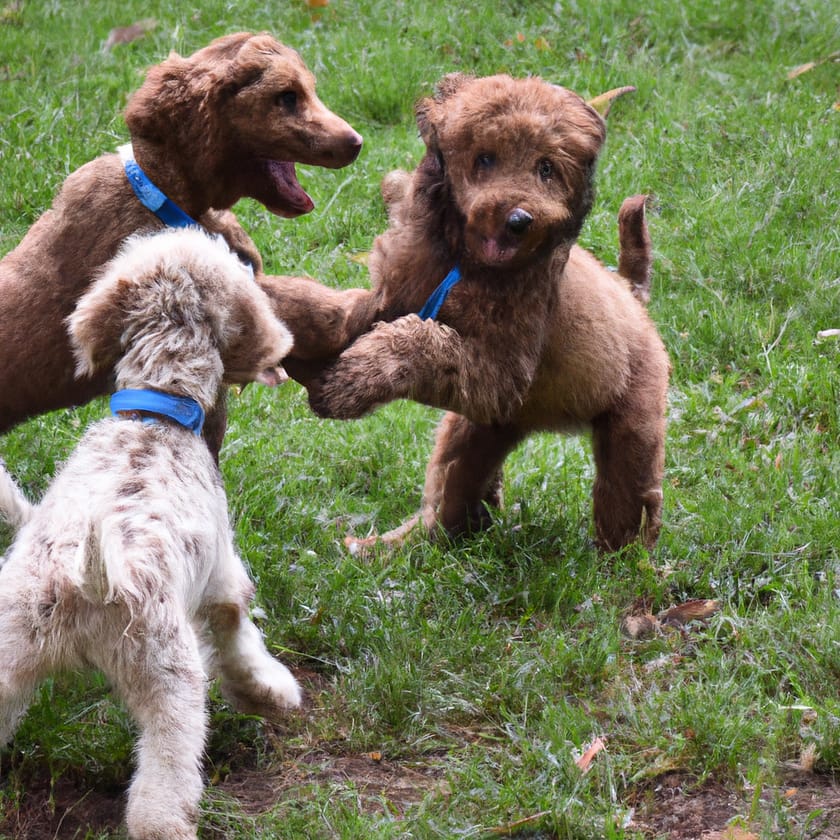
Combining Exercise and Socialization
Exercise and socialization can go hand in hand when it comes to doodle puppies. Combining these activities provides a holistic approach to their development and overall well-being. Here are some ways to integrate exercise and socialization:
Dog Parks and Playdates
Visiting dog parks or arranging playdates with other puppies or dogs can provide both exercise and socialization opportunities. It allows them to interact, play, and run around with other dogs in a safe and supervised environment. This helps them develop social skills while expending their energy.
Group Training Classes
Consider enrolling your doodle puppy in group training classes. These classes not only provide mental stimulation and obedience training but also offer a socialization platform. Interacting with other puppies and owners in a controlled environment promotes proper social behavior while engaging in fun activities.
Daily Walks in Different Settings
Take your doodle puppy on daily walks in different settings to provide exercise and exposure to various environments. This can include walks in parks, on busy streets, or in quiet neighborhoods. Varying the setting helps them become comfortable in different surroundings while fulfilling their exercise needs.
Interactive Toys and Games
Engage your doodle puppy in interactive toys and games that combine exercise and mental stimulation. Toys that require problem-solving skills or treat-dispensing toys can provide physical activity while keeping their minds engaged. This helps prevent boredom and ensures they stay physically and mentally active.
Potential Challenges and Solutions
During the exercise and socialization process, you might encounter some challenges with your doodle puppy. It is important to address these challenges promptly and seek professional help if needed.
Fear and Anxiety
Some doodle puppies may display fear or anxiety in certain situations or environments. It is important to identify the triggers and gradually expose them to these situations while providing positive reinforcement. Consultation with a professional dog trainer or behaviorist can help address these fears and anxieties through desensitization and counterconditioning techniques.
Leash Reactivity
Leash reactivity, where a doodle puppy exhibits excessive barking, lunging, or pulling on the leash when encountering other dogs or people, can be challenging. Consistent training and using positive reinforcement techniques can help redirect their attention and teach them appropriate on-leash behavior. Trainers experienced in working with reactive dogs can provide guidance and specialized training.
Aggression
In some cases, doodle puppies may display aggressive behavior towards other dogs or humans. Aggression should be addressed promptly, as it can lead to safety issues. Consultation with a professional behaviorist is essential to understand the root causes of aggression and develop a specialized training plan to manage and modify their behavior.
Professional Help
If you encounter significant challenges during the exercise and socialization process, do not hesitate to seek professional help. Dog trainers, behaviorists, or veterinarians with expertise in puppy development can provide guidance, techniques, and specialized training to address specific challenges and ensure positive development.
The Role of Owners in the Process
As an owner, you play a crucial role in the exercise and socialization of your doodle puppy. Your consistency, commitment, and positive reinforcement techniques contribute to their success in these areas.
Consistency and Commitment
Consistency is key when it comes to exercise and socialization. Set a routine and stick to it so that your doodle puppy knows what to expect. Commit to regular exercise sessions and socialization outings to create a stable and supportive environment that fosters their growth.
Positive Reinforcement
Using positive reinforcement techniques, such as treats, praise, and affection, helps reinforce desired behaviors during exercise and socialization. Reward your puppy for good behavior, such as walking politely on a leash or displaying friendly interactions with other dogs or people. Consistently rewarding positive behavior ensures they understand what is expected of them and motivates them to continue exhibiting those behaviors.
Monitoring and Guidance
Pay close attention to your doodle puppy during exercise and socialization. Observe their reactions, body language, and behavior to ensure they are comfortable and not overwhelmed. Provide guidance when needed, redirecting their attention or removing them from potentially stressful situations. Your presence and guidance help build their confidence and create a secure environment.
Adaptability to Individual Needs
Every doodle puppy is unique, and their exercise and socialization needs may vary. Be adaptable to their individual needs and preferences. Some puppies may be more energetic and require higher-intensity activities, while others may prefer more relaxed interactions. Tailoring exercises and socialization experiences to their specific needs ensures their engagement and enjoyment.
Creating a Safe and Supportive Environment
Creating a safe and supportive environment is essential for the exercise and socialization of doodle puppies. This includes puppy-proofing your home, ongoing supervision, providing socialization opportunities, and establishing boundaries.
Puppy-Proofing
Before engaging in exercise and socialization, make sure your home environment is puppy-proofed. Remove any hazards, such as toxic plants, small objects, or electrical cords, that could pose a risk to their safety. Ensuring a secure environment enables worry-free play and exploration both indoors and outdoors.
Ongoing Supervision
When engaging in exercise and socialization activities, provide ongoing supervision to ensure the safety of your doodle puppy. Keep an eye on their interactions with other dogs, people, and various environments. Promptly intervene if any potentially unsafe situations arise, and ensure they feel secure and supported throughout the process.
Socialization Opportunities
Create opportunities for your doodle puppy to socialize with others. Arrange playdates with other friendly dogs or puppies, visit dog-friendly places, and invite friends and family members to interact with your puppy. These socialization experiences help them develop positive associations with different individuals and environments.
Establishing Boundaries
Establishing boundaries is crucial in ensuring that exercise and socialization stay safe and productive. Teach your doodle puppy basic commands, such as sit, stay, and leave it, to provide structure and guidance during activities. Setting boundaries also includes understanding when your puppy may need a break or some quiet time, respecting their limits, and fostering a balanced approach to exercise and socialization.
Benefits of Exercise and Socialization on Behavior
Regular exercise and socialization have significant impacts on the behavior of doodle puppies. The benefits of these activities extend beyond physical fitness and social skills, leading to a well-rounded and balanced dog.
Reduced Anxiety and Stress
Exercise and socialization help doodle puppies release pent-up energy, reducing anxiety and stress. Physical activities provide an outlet for their energy, while positive social interactions boost their emotional well-being. By engaging in exercise and socialization, doodle puppies can develop resilience and cope better with various situations, leading to reduced anxiety and stress levels overall.
Improved Obedience
Through regular exercise and socialization, doodle puppies learn obedience and become more responsive to commands. They understand boundaries and appropriate behavior, making them easier to manage in various situations. The structure and guidance provided during exercise and socialization activities contribute to improved obedience and a well-behaved dog.
Enhanced Confidence and Independence
Exercise and socialization help doodle puppies develop confidence and independence. By exposing them to new environments, people, and animals, they learn to navigate unfamiliar situations with confidence. Positive experiences build their self-esteem and encourage independent decision-making. This confidence and independence extend beyond exercise and socialization and contribute to a well-adjusted and adaptable adult dog.
Conclusion
Exercise and socialization are essential aspects of doodle puppy development. These activities provide numerous benefits, including physical fitness, mental stimulation, energy release, and social skills development. By following exercise guidelines, implementing socialization tips, and combining exercise with socialization opportunities, you can ensure your doodle puppy grows up to be a well-adjusted, confident, and happy companion. As an owner, your commitment, consistency, and positive reinforcement techniques play a crucial role in their success. Remember to create a safe and supportive environment, monitor their behavior, and adapt to their individual needs. The benefits of exercise and socialization extend far beyond behavior, contributing to the overall well-being and happiness of your doodle puppy.


